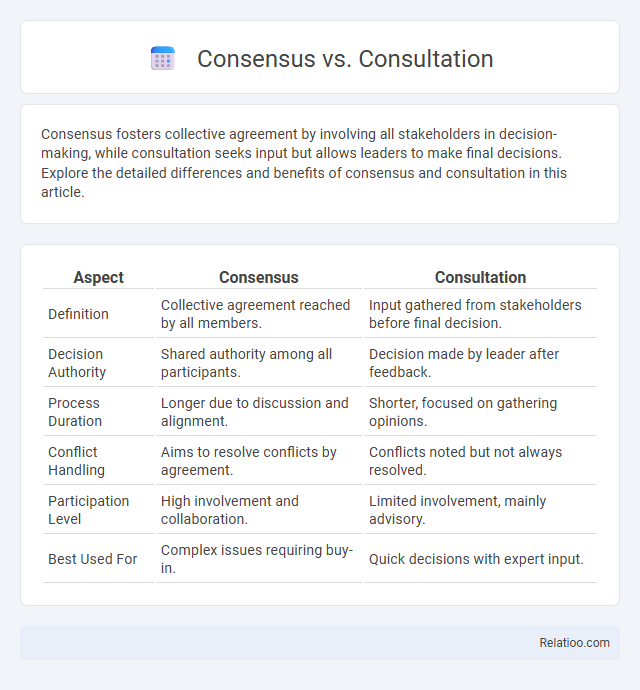Consensus fosters collective agreement by involving all stakeholders in decision-making, while consultation seeks input but allows leaders to make final decisions. Explore the detailed differences and benefits of consensus and consultation in this article.
Table of Comparison
| Aspect | Consensus | Consultation |
|---|---|---|
| Definition | Collective agreement reached by all members. | Input gathered from stakeholders before final decision. |
| Decision Authority | Shared authority among all participants. | Decision made by leader after feedback. |
| Process Duration | Longer due to discussion and alignment. | Shorter, focused on gathering opinions. |
| Conflict Handling | Aims to resolve conflicts by agreement. | Conflicts noted but not always resolved. |
| Participation Level | High involvement and collaboration. | Limited involvement, mainly advisory. |
| Best Used For | Complex issues requiring buy-in. | Quick decisions with expert input. |
Understanding Consensus: Definition and Key Features
Consensus is a collaborative decision-making process where all participants actively contribute to reach a general agreement that satisfies everyone's concerns. Key features include open communication, mutual respect, and the goal of finding solutions that everyone can support, ensuring inclusive participation and collective ownership. Your understanding of consensus highlights its emphasis on unity and cooperative problem-solving, distinguishing it from other methods like consultation or simple majority voting.
What Is Consultation? Core Concepts Explained
Consultation is a collaborative process where stakeholders share input and perspectives to inform decision-making without requiring full agreement. It emphasizes open dialogue and mutual understanding, allowing diverse viewpoints to be considered while the final decision remains with the leader or group managing the process. Your engagement in consultation ensures that varied opinions contribute to more inclusive and well-rounded outcomes.
Consensus vs Consultation: Main Differences
Consensus and consultation differ primarily in decision-making approach and involvement level. Consensus requires collective agreement from all parties, ensuring mutual commitment and shared responsibility for outcomes. Consultation involves seeking input or advice from stakeholders without necessitating unanimous agreement, allowing decision-makers to retain final authority.
Advantages of Building Consensus
Building consensus fosters collective ownership and strengthens commitment to decisions, ensuring long-term alignment and cooperation within teams or organizations. This approach enhances open communication, allowing diverse perspectives to be integrated, which improves decision quality and innovation. Consensus-driven processes reduce conflict and increase trust, leading to more sustainable and effective implementation of agreed-upon strategies.
Benefits of the Consultation Approach
The consultation approach enhances decision-making by actively involving stakeholders, leading to diverse perspectives and increased buy-in. It fosters transparency and trust, which improves communication and collaboration within teams or organizations. This method balances expert input and stakeholder interests, resulting in more informed and accepted outcomes.
Common Challenges in Consensus Processes
Common challenges in consensus processes include managing diverse stakeholder interests, overcoming communication barriers, and addressing power imbalances within decision-making groups. Ensuring transparency and fostering mutual trust are critical to prevent conflicts and facilitate genuine collaboration. Time constraints and the need for continuous negotiation often complicate achieving true consensus compared to consultation or majority-based approaches.
Potential Pitfalls of Consultation Methods
Consultation methods often present potential pitfalls such as limited participant engagement, leading to skewed feedback that does not represent the broader group's views. Your decisions may be compromised by dominant voices overshadowing quieter stakeholders, resulting in less effective outcomes. Misunderstandings and lack of clarity during consultation can further hinder achieving genuine consensus.
When to Choose Consensus Over Consultation
Choosing consensus over consultation is ideal when Your team requires collective agreement to ensure commitment and shared responsibility in decision-making. Consensus fosters collaboration by prioritizing the input and concerns of all members, making it suitable for complex issues that impact multiple stakeholders deeply. Consultation, in contrast, is better for gathering expert opinions quickly without necessitating full group alignment.
Effective Strategies for Combining Both Approaches
Effective strategies for combining consensus and consultation involve leveraging consultation to gather diverse perspectives and data, which then inform a consensus-building process that fosters collective agreement and commitment. Prioritizing transparent communication and active listening during consultation enhances trust, making the subsequent consensus phase more inclusive and aligned with stakeholder interests. Integrating these approaches increases decision-making quality and supports sustainable implementation by balancing expert input and group cohesion.
Real-World Examples: Consensus and Consultation in Action
Consensus fosters collective agreement by emphasizing shared goals and collaboration, as seen in cooperative business ventures where stakeholders align on decisions to ensure mutual benefit. Consultation involves seeking input from various parties without requiring full agreement, exemplified by local governments conducting public forums to gather citizen feedback before policy implementation. Your ability to distinguish these methods in practice enhances decision-making effectiveness across diverse organizational and community settings.

Infographic: Consensus vs Consultation
 relatioo.com
relatioo.com